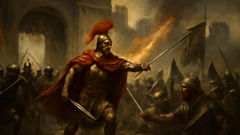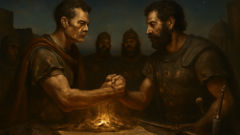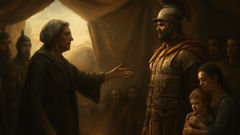Introduction
In the heart of ancient Rome, where the city’s red rooftops and marble columns shimmered beneath the Italian sun, a story unfolded that would echo for centuries across the empire. This was an age of steel and ambition, of noble lineages and unyielding principles, when the fate of a city could rest on the pride of one man. Gaius Marcius, known to history as Coriolanus, stood among the most formidable generals Rome had ever produced. His courage was legendary, his loyalty fierce, and his sense of honor—unyielding. Yet, in a world that revered strength and valor, it was not the sword but the heart that would determine his destiny.
Coriolanus’s journey was shaped by the crucible of war. From the smoke-filled battlefields of Corioli, where he earned his name by conquering Rome’s sworn enemies, to the sacred halls of the Senate, every stride was watched by citizens and patricians alike. Admired for his bravery, he was feared for his temper and pride. As Rome’s enemies gathered at her borders and hunger gnawed at the city’s poor, Coriolanus’s fortunes rose—then collapsed in a storm of political intrigue and public outrage. Accused of betraying the very people he fought for, exiled from the city he called home, he wandered a stranger in a land he had once defended.
Yet the ember of resentment burned hot within him. Cast out and spurned by Rome, Coriolanus would find an unlikely alliance with the Volscians, the ancient rivals he once vanquished. Together they marched upon the very gates of Rome, threatening its destruction. And as the city trembled before its lost son, it was not the legions or the orators who would decide its fate, but a mother’s courage and a family’s love. In this tale, the clash of pride and humility, vengeance and forgiveness, weaves a tapestry as enduring as the stones of Rome itself.
I. The Rise of Coriolanus
The city of Rome, in its earliest centuries, was not yet the sprawling capital of legend, but a city in constant struggle—against hunger, against invaders, and against the storms that raged within its own walls. Born into the proud Marcii family, Gaius Marcius grew up in a world of ancient oaths and ambitions. His mother, Volumnia, was a woman of iron will, her dreams for her son as grand as the Capitoline temples that rose above the Forum. She fed him tales of Rome’s founding and the exploits of heroes, molding him into a boy who revered honor above all else.

It was in the fields outside the besieged city of Corioli that young Marcius earned his eternal name. The Volscians, fierce rivals of Rome, had gathered at Corioli’s walls, laying siege with relentless fury. The Roman Senate, desperate for victory, called upon its bravest commanders. Marcius—tall, broad-shouldered, his face marked by both youth and battle—took command. The siege was brutal: flames devoured houses, the cries of the wounded mingled with the clash of shields. It was Marcius who led the charge when the gates finally cracked, his sword flashing as he drove back the Volscians and claimed the city for Rome. In gratitude, the people named him Coriolanus, and his legend was born.
His fame brought him to the heart of Roman power. The Senate, awed by his battlefield prowess, welcomed him into their marble halls. But the city itself was restless. Years of war had left granaries bare. The common people, the plebeians, grew hungry and angry, accusing the wealthy patricians of hoarding grain and neglecting their needs. Coriolanus, born of noble blood and raised to value order above all, struggled to understand their grievances. He saw only the necessity of discipline, the need for Rome to stand united against her enemies.
When the Senate, at last, agreed to distribute grain to the people to quell unrest, Coriolanus stood firm in opposition. To him, it was weakness—a surrender to disorder. He demanded that Rome’s leaders revoke the hard-won rights of the plebeians, believing that only the stern hand of tradition could secure the city’s future. The people, hearing his words, erupted in outrage. What began as a political dispute grew into a public outcry. In the Forum, voices rose in anger. Coriolanus was called traitor and tyrant. The Senate, fearing violence, had no choice but to exile their greatest general.
Betrayed by the very city he’d fought to defend, Coriolanus left Rome with nothing but his armor and his wounded pride. He wandered the countryside, a solitary figure whose shadow stretched longer than the walls of Rome themselves. He sought shelter among strangers, finding none. Yet as he walked, the bitter seed of vengeance took root in his heart—a longing not for return, but for retribution.
The world he knew had turned its back on him. Yet fate, as it often does in Rome, had not finished weaving its tapestry.
II. The Exile’s Pact
The road beyond Rome was hard and unforgiving. Coriolanus passed through villages that eyed him with suspicion, his armor now a relic of the city that had cast him out. His pride, once a badge of honor, became a burden that pressed down on his every step. Nights were spent beneath olive trees, sleepless and haunted by memories of home—the laughter of his young son, the stern gaze of Volumnia, the distant bells that marked Rome’s dawn.

It was in the rugged hills of Latium that Coriolanus found himself at a crossroads—both literal and figurative. Word spread quickly of his exile, and before long, spies and enemies alike took notice. One night, as he sat by a meager fire, shadows emerged from the darkness. Men in Volscian armor encircled him, swords drawn. But Coriolanus did not flee. Instead, he rose to his full height, eyes blazing with defiance. Their leader, Attius Tullius Aufidius, stepped forward. Tullius had been Coriolanus’s bitterest foe in battle, yet even he could not ignore the opportunity before him.
Tullius saw what few could: a Roman general, wounded and desperate, could become a weapon more dangerous than any legion. He offered Coriolanus a choice—remain an exile, scorned and alone, or join the Volscians and strike at the city that had turned against him. At first, Coriolanus hesitated. Loyalty to Rome was written into his bones. But the sting of betrayal and the ache for vindication won out. In a pact sealed by firelight and shared resolve, Coriolanus took command of Volscian armies, promising to lead them not just against Rome’s allies, but against the heart of Rome itself.
The campaign that followed was swift and brutal. Village after village fell before the combined might of Coriolanus and Tullius. Roman commanders, who had once served beneath Coriolanus’s banners, found themselves outmaneuvered at every turn. The countryside burned; refugees crowded the city gates, begging for mercy. Inside Rome, panic spread. Senators whispered of omens and curses. The plebeians remembered the day they drove Coriolanus from their midst—and now dreaded the price.
Coriolanus showed no mercy. Each conquest was another stone in the wall of his bitterness. Yet even as Volscian cheers greeted his victories, he remained restless. In the quiet hours after battle, his thoughts drifted to his family. He wondered whether his mother’s pride had become sorrow, whether his son’s eyes had filled with fear at tales of his father’s wrath. The road to revenge was not as straight as it had seemed.
Still, the inexorable march continued. At last, Coriolanus’s army stood at the very threshold of Rome. The city’s walls loomed ahead, battered by fear and regret. And within those walls, Rome’s leaders weighed their options—hoping for salvation, or perhaps for a miracle.
III. The Siege and the Mother’s Plea
Rome trembled as Coriolanus’s army encamped just beyond her gates. The city was a cauldron of fear—its markets empty, its people huddled in darkened homes, its leaders divided between desperate negotiation and stubborn defiance. The sight of Coriolanus at the head of the Volscian host filled even the bravest hearts with dread. Here was the city’s own son, returned not as savior but as executioner.

Envoys streamed from the Senate to Coriolanus’s camp, bearing olive branches and words of peace. They offered gold, lands, even an end to his exile. But Coriolanus, his eyes cold as steel, rejected them all. He demanded total surrender—a price too steep for any Roman to pay. With every refusal, hope ebbed further from the city’s streets.
Inside her modest villa, Volumnia kept vigil. The proud matron who had shaped Coriolanus’s every ambition now paced the marble floors in anguish. Beside her, Coriolanus’s wife, Virgilia, clung to her son, both praying for a deliverance none could see. At last, Volumnia resolved that if Rome was to be saved, it would not be through force or negotiation, but through the bonds of blood.
Draped in plain garments, Volumnia led a small procession out of Rome’s gates: herself, Virgilia, and Coriolanus’s young son. The guards made way in silent awe as the three passed beneath the shadow of Rome’s ancient walls. Outside, the Volscian soldiers parted before them, whispering of courage and destiny.
Coriolanus, seated in his command tent, was not prepared for the sight of his family. At first he stood unmoving, anger and confusion warring within him. Volumnia approached, her eyes fierce and resolute. In a voice sharpened by years of love and disappointment, she spoke not only as his mother but as the mother of Rome. She reminded him of all she had sacrificed—her son’s childhood, her peace, her happiness—for the glory of Rome. She spoke of honor, but also of mercy; of vengeance, but also of forgiveness. She asked him: would he truly become the destroyer of all he had once loved?
Virgilia pleaded too, her words soft but trembling with desperation. Their young son gazed up at Coriolanus with silent confusion, searching for the father he remembered. In that moment, the man who had faced armies and outlasted storms felt his pride collapse beneath the weight of love. Tears carved silent tracks down Volumnia’s cheeks. The silence hung heavy—a silence more powerful than any command or threat.
At last, Coriolanus knelt before his mother. The army watched in stunned quiet as their feared leader embraced the family he’d nearly destroyed. Rising, he turned to Tullius and the Volscians and declared an end to the siege. Rome would be spared—not for her Senate or her citizens, but for the woman who had given him life and taught him what it meant to be truly noble.
With those words, Coriolanus sealed his own fate. The Volscians, denied victory at the very edge of triumph, would not forgive so easily. As Rome rejoiced in salvation, Coriolanus prepared for the reckoning that would follow.
Conclusion
Coriolanus’s decision to spare Rome came at a high price. The Volscians, furious at their lost conquest, saw in him not a leader but a traitor to their cause. Tullius Tullius Aufidius, once his ally, became his accuser. In a final confrontation, surrounded by former comrades, Coriolanus accepted his fate without resistance. His end was not marked by glory in battle, but by the quiet dignity with which he met the consequences of his choices.
Yet in Rome, his name echoed with a new kind of legend. The city he had nearly destroyed now remembered him not only for his valor and strength but for his moment of humanity—when pride bowed to love, and vengeance yielded to forgiveness. Volumnia lived to see her son’s redemption inscribed into the memory of Rome, a lesson for generations that power is nothing without mercy. In the silent courtyards where olive trees grew and children played, mothers told their sons the story of Coriolanus—not as a warning, but as a hope that even the proudest hearts might find their way home.


















